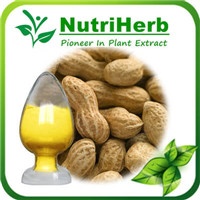Luteolin, 3′,4′,5,7-tetrahydroxyflavone, is a common flavonoid that exists in many types of plants including fruits, vegetables, and medicinal herbs. Plants rich in luteolin have been used in Chinese traditional medicine for treating various diseases such as hypertension, inflammatory disorders, and cancer. Having multiple biological effects such as anti-inflammation, anti-allergy and anticancer, luteolin functions as either an antioxidant or a pro-oxidant biochemically. The biological effects of luteolin could be functionally related to each other. For instance, the anti-inflammatory activity may be linked to its anticancer property. Luteolin’s anticancer property is associated with the induction of apoptosis, and inhibition of cell proliferation, metastasis and angiogenesis. Furthermore, luteolin sensitizes cancer cells to therapeutic-induced cytotoxicity through suppressing cell survival pathways such as phosphatidylinositol 3′-kinase (PI3K)/Akt, nuclear factor kappa B (NF-κB), and X-linked inhibitor of apoptosis protein (XIAP), and stimulating apoptosis pathways including those that induce the tumor suppressor p53. These observations suggest that luteolin could be an anticancer agent for various cancers. Furthermore, recent epidemiological studies have attributed a cancer prevention property to luteolin. In this review, we summarize the progress of recent research on luteolin, with a particular focus on its anticancer role and molecular mechanisms underlying this property of luteolin.

Luteolin is a flavonoid found in various plant sources. Luteolin exhibits antioxidative, anti-inflammatory, neuromodulatory, anti-diabetic, antihypertensive, and anticancer chemotherapeutic activities. In vitro and in vivo, luteolin inhibits LPS-induced expression of IL-6 by inhibiting JNK phosphorylation and decreasing the binding of AP-1 transcription factor to the IL-6 promoter. In animal models of experimental autoimmune encephalitis (EAE), luteolin inhibits mast cell activity and mast cell-dependent T cell activation, lessening disease pathology. Luteolin inhibits phosphodiesterases (PDE 1-5) and may also inhibit α2-adrenergic receptors as it reverses xylazine/ketamine-induced anesthesia in vivo. Luteolin also increases monoamine transport, potentially through potentiation of DAT and NET. In diabetic mice, luteolin decreases mast cell and macrophage infiltration, expression of inflammatory cytokines, glucose tolerance, insulin sensitivity, and apoptosis. Luteolin decreases systolic blood pressure in spontaneously hypertensive rats and decreases expression of MMP9 and VEGF, suppressing tumor growth in animal models with gastric cancer xenografts. Additionally, luteolin inhibits heat shock protein 90 (HSP90) and IGF-1R.
For more detail information,please visit: http://www.naturemfg.com/
Or send mail to : sales@naturemfg.com